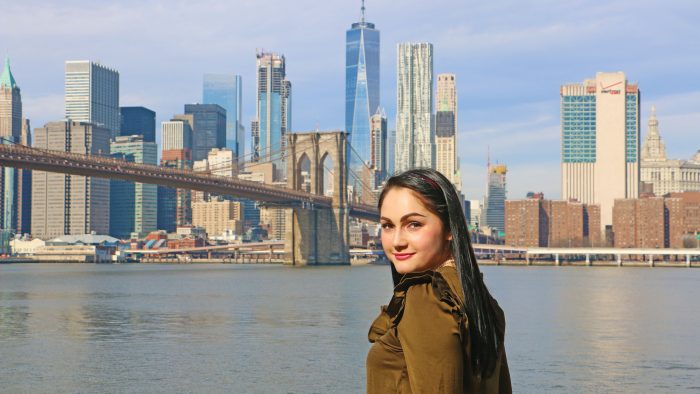 Social Sciences
Social Sciences
International Intrigue

Alyssa Goessler has gone straight from the tree-lined campus of the University of Oregon to the hallowed halls of the United Nations in New York City. The 2016 graduate (above), who received her degree in general social sciences, was recently hired as an administrative assistant in the Jordanian embassy.
According to Goessler, every day in the UN brings a new revelation—surprises and insights come so fast she can scarcely keep up with them. Among her favorites:
Stuffing envelopes—a job fit for an ambassador. Goessler was starstruck when she met Jordanian ambassador Sima Bahous, a well-respected figure who leads development programs throughout the Arab region.
But even an ambassador helps with the busy work. Goessler found herself elbow-to-elbow with Bahous one day, handling a mailing for a fundraiser. “It was quite humbling to see that someone who is such a leader is normal and struggles with the same things we all struggle with,” Goessler said—“trying to fit something inside of an envelope.”
How to speak “diplomat.” The importance of communications style in the UN can’t be overstated—every letter, every email, every memo must include the proper titles, salutations and expressions of gratitude that comprise the customs of international diplomacy.
“Even if it’s only to RSVP, there are layers and layers of diplomatic phrasing, like ‘the ambassador of Jordan avails herself of this opportunity . . .,’” Goessler said. “I’ve always been pretty well-spoken, but diplomatic language is a whole different vocabulary.”
The art of assertiveness. Goessler was raised to be polite, but she’s learning how to be just pushy enough to get things done. “I’ve gotten much better at respectfully marching into somebody’s office and saying, ‘If we don’t take action on this matter, this, that or the other is going to happen’—they appreciate that,” she said. “Jordan is a kingdom, and rank really matters, so it’s a little daunting.
But if you have something you need to tell the ambassador, you need to tell
the ambassador.”
Quid pro quo– it’s not just a Latin expression. Goessler tracks nominations made by each country for appointment of their officials to committees; she does this so that countries which need Jordan’s vote for their nominee one day can repay the favor when her embassy needs a vote for their own nominee. “The essence of diplomacy,” Goessler said—“I scratch your back, you scratch mine.”
English + Arabic = Aspirin. Goessler minored in Arabic studies and in her role she’s constantly switching between English and Arabic. Her first two weeks were memorable not just for the excitement of the experience but for a dual-language-induced “dull, lingering headache.”
Snowed out. Goessler was thrilled to help plan a high-level UN meeting on peace in the Middle East that was to involve more than a dozen ambassadors and foreign ministers, many of whom were flying into NYC for the event. The scheduling consumed her life for three weeks—then a blizzard walloped the city and the meeting was canceled. “Kind of a nightmare,” she said.
The opposite of “stressed” is “desserts.” Coworkers quickly discovered that the way to help Goessler relax is to “just give her food.” Treats started appearing on her desk and colleagues back from lunch would “just happen” to produce an extra sandwich. “Food hospitality is a huge thing in the Middle East and that holds true in my office,” Goessler said. “It’s another part of Middle Eastern culture that I love learning about here.”
—Jim Murez


 Twitter
Twitter Facebook
Facebook Forward
Forward